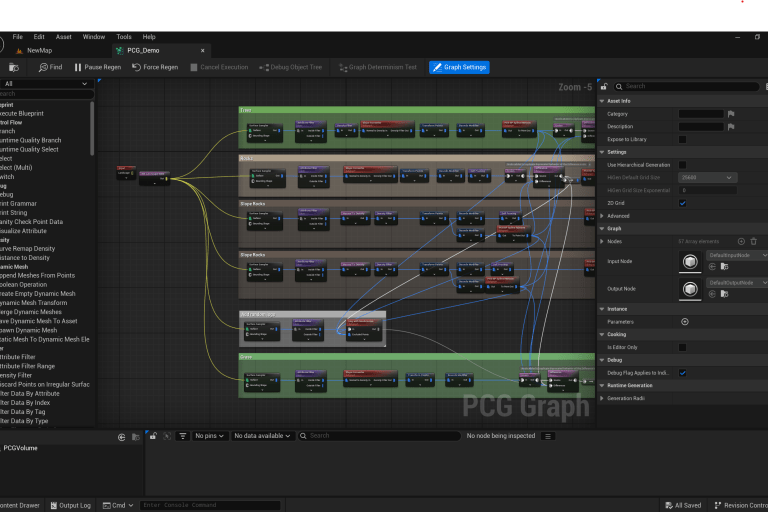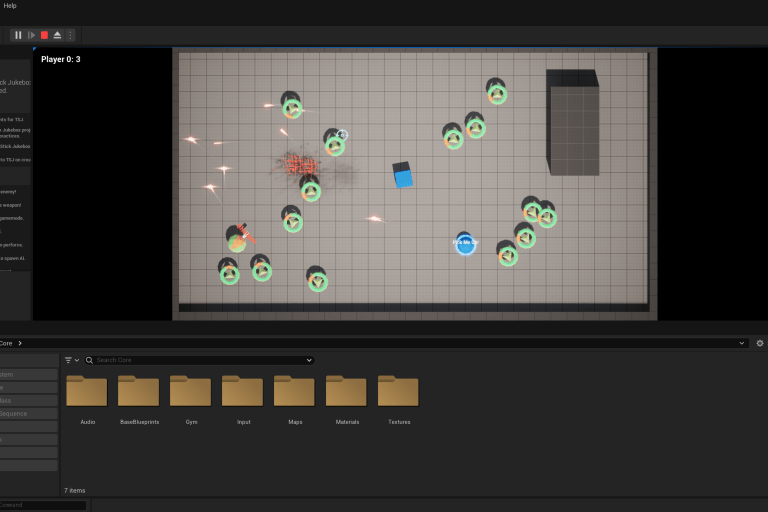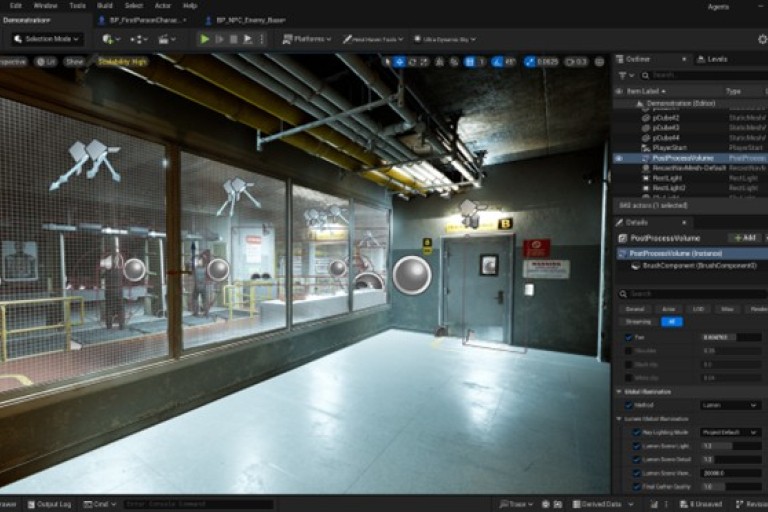Our Unreal Engine trainers
- Tim van Kan
One of our Unreal Engine Authorised trainers is Tim van Kan, currently working as a Technical Design lecturer for second-year students in the Game Design & Production course within the Creative Media and Game Technologies programme at BUas. With expertise in Unreal Engine’s diverse applications, ranging from foundational techniques to complex design implementations, Tim provides students with individual guidance, feedback, and comprehensive course materials, including videos, lectures, and template projects. For any questions, feel free to reach out at [email protected].
LinkedIn Profile | EPIC Certified Badge | EPIC Community Profile
- Justin van Oort
Another one of our Unreal Engine Authorised Trainers is Justin van Oort, who teaches Technical Design to third-year students in the Game Design & Production programme. With hands-on AAA experience from studios like Sumo Digital, Vertigo Games, and Mojang Stockholm, Justin brings real-world insights into Unreal Engine development. His teaching focuses on guiding students through their year-long production projects, emphasising prototyping and scalable production methodologies for large teams. For any questions, feel free to reach out to [email protected].
LinkedIn Profile | EPIC Certified Badge | Personal Website
- Joey Relouw
Joey Relouw is an Unreal Engine Authorized trainer and works as R&D Coordinator and Art Lead at Cradle, the research and development team within the Academy for AI, Games & Media at BUas. He leads a multidisciplinary team focused on innovation in areas such as VR/AR, virtual production, virtual humans, and serious games. With a background in digital art and emerging media, Joey earned the Unreal Fellowship: Worldbuilding in 2023 and became an Unreal Authorized Instructor in 2025. For any questions, feel free to reach out at [email protected].
LinkedIn Profile | EPIC Certified Badge 1 | EPIC Certified Badge 2 | Cradle Website
- Remco Willemsen
One of our Unreal Engine Authorised Trainers is Remco Willemsen, a versatile technical artist and generalist. His work spans a wide range of disciplines within the games and media industry, including shader development, lighting, texturing, rigging, animation, sculpting, optimisation, and platform-specific development for VR, AR, mobile, and console. With a strong combination of artistic vision and technical expertise, Remco supports students in bridging the gap between creative ideas and practical implementation. He guides them towards effective solutions for achieving high visual fidelity in real-time environments. For any questions, feel free to reach out via [email protected].
LinkedIn Profile | EPIC Certified Badge | ArtStation- Dana van der Wal
One of our Unreal Engine Authorised Trainers is Dana van der Wal, who teaches foundational Technical Design to first-year Design & Production students. Specialising in introducing students to Unreal Engine as a professional tool, Dana focuses on establishing core competencies and industry-standard workflows from the ground up. The curriculum emphasises essential engine fundamentals, project organisation, and best practices that prepare students for game creation and professional development. Through structured tutorials, hands-on exercises, and mentored projects, students build confidence in navigating Unreal Engine’s interface and core systems. For any questions, feel free to reach out at [email protected].
LinkedIn Profile | EPIC Certified Badge | Personal Website
- Niels Voskens
One of our Unreal Engine Authorised Trainers is Niels Voskens, a Technical Artist with extensive experience in teaching virtual production pipelines, directing motion capture shoots, and designing efficient implementation workflows as part of the Research & Development team. His work focuses on bridging creative and technical disciplines within student-led productions and research projects. Niels studied Visual Arts in the Creative Media and Game Technologies programme and became an Unreal Authorised Instructor in 2025. For any questions, feel free to reach out via [email protected].
LinkedIn Profile | EPIC Certified Badge | ArtStation
- Alexander van Buggenum
One of our Unreal Engine Authorised Trainers is Alexander van Buggenum, a 3D generalist with a background in games and commercial VFX. He works at Cradle R&D, the research and development team at the Academy for AI, Games & Media (AGM). His expertise spans a wide range of subjects, including character and asset pipelines from concept to integration, motion capture, animation, and Unreal Engine workflows. In 2024, he completed the Unreal Fellowship: Games, further deepening his experience with Unreal’s technical systems and game design. He became an Unreal Authorised Instructor in 2025. For any questions, feel free to reach out via [email protected].
LinkedIn Profile | EPIC Certified Badge
- Dave De Breuck
One of our Unreal Engine Authorised Trainers is Dave De Breuck, a programmer specialising in engine development, gameplay systems, and technical workflows. As the only programmer at BUas with a UAI badge, Dave brings a strong focus on software architecture, C++ programming, and professional coding practices within Unreal Engine.
His teaching emphasises writing clean, maintainable, and scalable code, preparing students for the demands of professional game development. By bridging the gap between high-level design and low-level engine functionality, Dave helps students gain confidence in tackling technical challenges, ranging from gameplay programming to engine-level problem solving.
Dave believes that while blueprints are powerful, sometimes nothing beats a well-placed semicolon. For any questions, feel free to reach out via [email protected].
LinkedIn Profile | EPIC Certified Badge | Personal Website | GitHub
- Robbie Storm
One of our Unreal Engine Authorised Trainers is Robbie Storm, a Technical and Real-time FX Artist with a strong passion for workflows and pipeline development. His expertise spans real-time FX creation, materials, shaders, and C++ programming for tools and pipeline design, giving him a rare combination of artistic vision and technical know-how that he brings into the classroom.
Robbie inspires students to use technology as a tool to realise their artistic ideas. By bridging the gap between creative concepts and technical execution, he guides them through the intricacies of DCC tools, helping them grasp not only the how but also the why behind technical artistic choices. This way, students build both the creative intuition and the technical skills needed for a career in professional game development.
If you have any questions, feel free to get in touch via [email protected].
LinkedIn Profile | EPIC Certified Badge
Unreal Engine courses

Unreal Engine Deep Dive (Beginner Level)
This beginner-friendly course introduces participants to essential Unreal Engine features and tools through engaging, design-focused lectures. Far from basic introductions, each session explores both foundational and advanced techniques, empowering designers to harness Unreal’s full potential for professional growth and portfolio-building. This course aims to create awareness around awesome features of Unreal Engine.

Twin Stick Jukebox – Action Game Toolkit (Intermediate Level)
The Twin Stick Jukebox course is designed for intermediate learners ready to deepen their Unreal Engine skills. Using a provided game-development toolkit, students individually create a compelling, polished action game. Throughout the course, they learn more about concepts such as inheritance, components, interfaces, and AI behaviour trees, while collaborating in small groups for continuous feedback and improvement.

Large-Scale Advanced Game Development in Unreal Engine
In this course, participants will experience what it’s like to work in large teams using Unreal Engine. It elevates their skills from intermediate to advanced and builds competence in more complex Unreal Engine concepts within the Gameplay Framework. They will also explore relevant tools such as Unreal Insights and the Gauntlet Framework to support their project development.
Unreal Engine Deep Dive Course (Beginner Level)
Topics Covered:
- Materials & Shaders: From Material Instances to Dynamic Material Instances and World Position Offset. It shows the power and versatility of materials in Unreal.
- Sequencer: Animating game objects and creating cinematic transitions to and from gameplay.
- Animation Blueprints: How to get started with animation blueprints, skeletal meshes, and animation montages.
- Procedural Content Generation (PCG): Combining procedural methods with manual level design. This introduction dives into PCG as a tool for designers.
- Artificial Intelligence: Behaviour trees, AI controllers, and custom AI behaviours.
- Marketplace Content (Fab): Designing, preparing, and publishing packages for Unreal Marketplace.
- Materials & Shaders
Students learn core material creation in Unreal Engine, starting from basic Material Instances to more sophisticated Dynamic Material Instances. Advanced techniques such as World Position Offset are covered to allow dynamic interactions and awesome environmental effects.
- Sequencer
This module covers using Unreal’s powerful Sequencer tool to animate game objects and create cinematic sequences. Participants will learn how to set up animations, transitions, and produce cinematic intros and outros. It also shows examples of how to use sequencer for gameplay or how to show your work throughout the block as a level designer.
- Animation Blueprints
Students explore how to bring characters to life through Animation Blueprints, learning about skeletal meshes, animation montages, and the interaction between standard Blueprints and Animation Blueprints to create compelling character animations.
- Procedural Content Generation (PCG)
This session demonstrates an introduction to PCG in Unreal engine, how do we get started with this new tool. It also talks about combining procedural generation techniques with manual level design, enabling participants to efficiently populate environments while maintaining control over key design elements.
- Artificial intelligence
A comprehensive introduction to Unreal’s AI framework, including behaviour trees, AI controllers, and custom behaviour set-ups. Students will get a better understanding of how to start creating their own AI that makes decisions and acts upon them.
- Marketplace Content (Fab)
Participants receive practical guidance on creating and publishing content for the Unreal Marketplace, understanding best practices, marketplace standards, and how to effectively target specific user groups with compelling, professional packages.
Twin Stick Jukebox Course – Action Game Toolkit (Intermediate Level)
Key Learning Outcomes
- Develop and integrate gameplay mechanics (game modes, weapons, enemies).
- Adhere to template established work flows (inheritance, commenting, naming).
- Apply Systems Thinking for effective game balancing and user experience design.
- Practise iterative game development using professional pipelines and Perforce.
- Project Set-up & Toolkit Overview
Participants dive into the provided Twin Stick Jukebox toolkit, exploring its structure including Blueprints, inheritance hierarchies, and component-based architecture. This practical toolkit is extensively designed to demonstrate core Unreal Engine development practices, enabling learners to build comprehensive action game mechanics efficiently.
- Game Development Pipeline
Participants follow an Unreal-focused development pipeline, structured into:
- Proposal & Concept Development:
- Learners conceptualise their game, specifically detailing technical implementation goals aligned with Unreal Engine’s capabilities.
- Prototype & Design Breakdown:
- Participants prototype gameplay features using Blueprints and other relevant features.
- Design documentation explicitly maps out Engine-specific implementations, focusing on things such as gameplay loops and mechanic interactions.
- Functional Development:
- Creation of core game loops and mechanics such as Game Modes, Game States, Player Controllers, and pawn/enemy interactions.
- Initial implementation of weapon and enemy behaviour systems using Blueprint and/or build upon the template its use of existing actors and behaviour trees.
- Presentable (Stretch Goal):
- Further refining gameplay using advanced Blueprint techniques, and creating polished user experiences through enhanced animations, particle effects, UI, and audio integration within Unreal Engine. At this stage it’s up to the student to decide what adds most to their project.
- Proposal & Concept Development:
- Technical Skills Development
Students gain in-depth exposure to:
- Inheritance & Components: Effective use of inheritance to build scalable game systems and leveraging components for modularity within Unreal.
- Behaviour Trees & AI Controllers: Designing complex enemy behaviours and decision-making processes utilising Unreal Engine’s robust AI tools.
- Blueprint Interfaces: Establishing efficient communication between independent game systems.
Project Deliverables:
- Comprehensive Unreal Engine project submitted through Perforce, demonstrating proficiency in technical implementations.
- Playable, packaged build suitable for presentation and portfolio purposes.
- Documentation & Resources
Detailed Unreal-specific documentation, step-by-step implementation guides, and targeted tutorial videos ensure participants achieve clear, measurable progress and proficiency in Unreal Engine.
